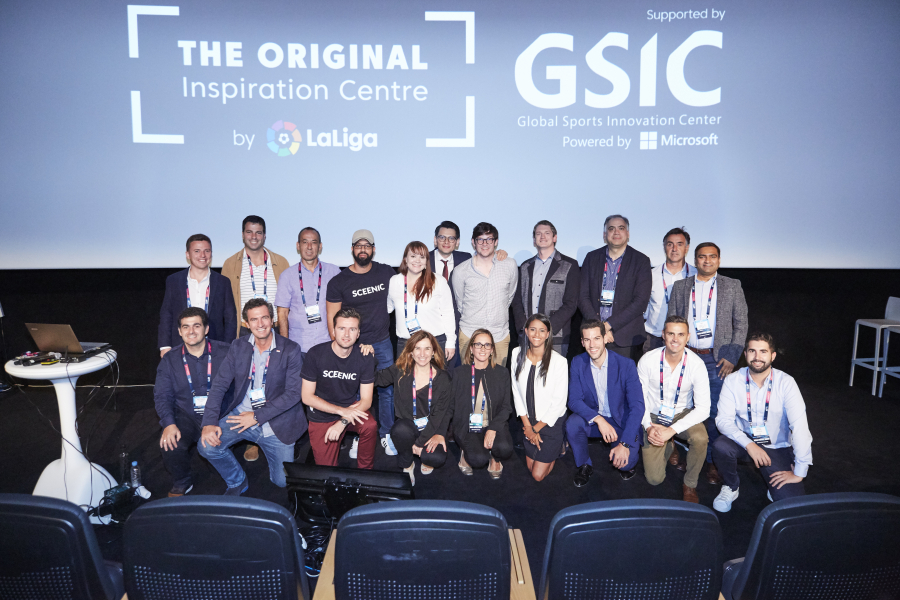
- LaLiga partnered with Microsoft’s GSIC to select 10 projects after receiving 279 applications from 55 countries.
- One representative from each finalist attended World Football Summit to discuss their product.
When it comes to technology in football, if you’re standing still then you’re really going backwards. Keen to remain one of the technological leaders in the industry, LaLiga launched a competition for the world’s most forward-thinking start-ups through its Innovation Hub, that was created with Microsoft’s Global Sports Innovation Center (GSIC).
After receiving 279 applications from 55 countries, 10 of the projects were selected. Each finalist is able to benefit from a LaLiga immersion week, a three-month acceleration programme with GSIC, workspace at GSIC offices and much more. Any pilots approved by LaLiga can go into development to help take Spanish football to the next level.
One representative from each start-up spoke at the World Football Summit event taking place at Madrid’s Teatro Goya on September 24th and 25th. They each discussed their winning proposal at a couple of round table events hosted by Javier Martínez, an ambassador for GSIC. These panels were focussed on the subjects of media and fan engagement stories and of smart venue and performance stories.
The finalists at round table one: Media and fan engagement stories
- Cinfo – Represented by José Ramón Gulías
Cinfo is a company that specialises in artificial intelligence, 5G, video technology and more. “We think that we can give value to the media of LaLiga and its clubs and generate new content for the teams,” he said. “You have to adapt to the technology and to the changes in user behaviour, so that you’re always aware of what they really enjoy. You can generate new products for the fans and for the sponsors.” - Spalk – Represented by Ben Reynolds
Offering multilingual commentary for a match, or even just different styles of commentary, is what Spalk do. “We are a virtual commentary studio,” Reynolds put it as he gave his elevator pitch. “We help sports leagues by having commentators sitting anywhere in the world commentating a live video.”
- Sceenic – Represented by Paul Bojarski
The top software provided by Sceenic is their ‘watch together’ software. “It’s like skyping or facetiming with your friends whilst you watch sports together and you can’t be together,” Bojarski explained. “We can add value to keep communities together as they watch around the world.”
- Tookens – Represented by Francisco Arechaga
Tookens’ way of boosting fan engagement is by helping footballers to offer something fresh and new on social media. “Basically what we do is we’ve built from the ground up a new social network based on blockchain,” Arechaga said. “The added value of that is increasing engagement value and empowering football players and clubs to not post vanity on social media, but to also create value and to give that value to the fans.”
- FanWide – Represented by Symon Perriman
The solution being offered by FanWide is that of bringing supporters of clubs together to watch their team play if they live in or are travelling in other cities. “What we realised is that sports is a global business, with fans all around the world, and we’re helping LaLiga connect with that,” Perriman told the audience at World Football Summit. “Sports is one of the few things that’s still live, that people want to see in real time. So we’ve been given the opportunity to make it even better for billions of fans around the world.
@fanwide wins the international competition from @laliga and @sport_gsic https://t.co/rAQI9lZp5Z #FanWide @symonperriman pic.twitter.com/kEcERWzB7A
— FanWide (@FanWide) September 30, 2019
The finalists at round table two: Smart venue and performance stories
- Solos – Represented by George Monemvasitis
Smart clothing is behind Solos’ vision for improving the fan experience. Monemvasitis revealed that the average person wears 23 tags per day and Solos are finding new uses for these. “As the business grew, the tags became digital,” he said. “We’re using our history and our experience of the tag to embed it in sports merchandise and to attach it to the football shirt and it becomes your ticket or wallet for the venue and you can get discounts at your favourite sponsored events.”
- Snaptivity – Represented by Volha Paulovich
Snaptivity’s innovative idea is to use robotic cameras to help capture fans’ emotions at a game in a way that they cannot do themselves. “It is a smart venue technology, powered by fan emotions,” was Paulovich’s way of summing up Snaptivity. “In a football match, it’s a bit more difficult to take a picture because then you’re distracted from the reason you’re there in the first place. We developed technology to make sure that every attendee has content from the match.”
- ThermoHuman – Represented by Ismael Fernández
ThermoHuman is involved in the performance side of the game and their objective is to help clubs gain a better understanding of how close to an injury their players might be. “We use a technology called thermography to prevent and monitor injuries,” Fernández said. “It’s basically the same logic as using a thermometer to know if you have fever or not.” It’s not just about injury prevention, as there can also be a financial saving. “The idea is to improve the health and performance of teams, but also to impact the economic side of institutions by saving money and time,” Fernández added.
- Instituto de Biomecánica de Valencia – Represented by Rosa Porcar
Porcar spoke about a tool that has been developed by the applied research centre in biomechanics of the Instituto de Biomecánica de Valencia. Their latest project is a low-cost 3D body scanner. “With an app and with only two photos that you take with the app, you obtain a 3D model of your body, which is very accurate with an accuracy comparable with high-resolution scanners.” This can be done in under a minute, which Porcar said should encourage sports teams to measure and study their players’ bodies more frequently, since it’s much quicker than the manual method of taking measurements.
- Jump – Represented by Jesús Herrero
More and more people are watching football matches on mobile phones or tablet devices and Jump have been working in this field for some time. “We have an engagement and analytics platform to help companies in the entertainment industry to make the right decisions based on data,” Herrero explained. “We’re really happy that LaLiga’s strategy is about becoming a global entertainment company, and also paying a lot of attention to the big data.”
